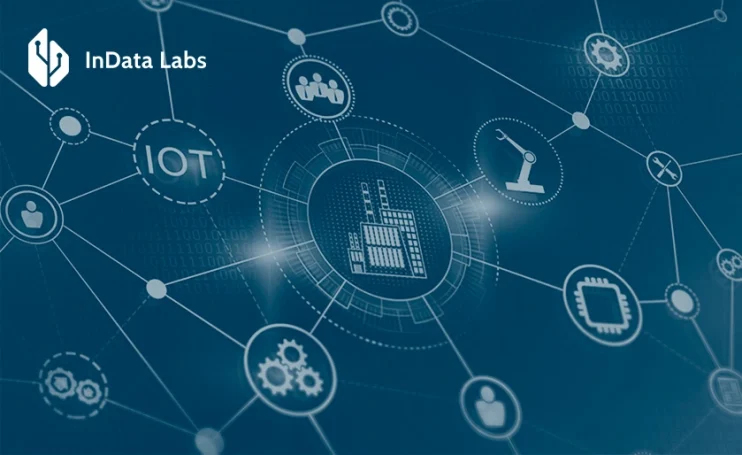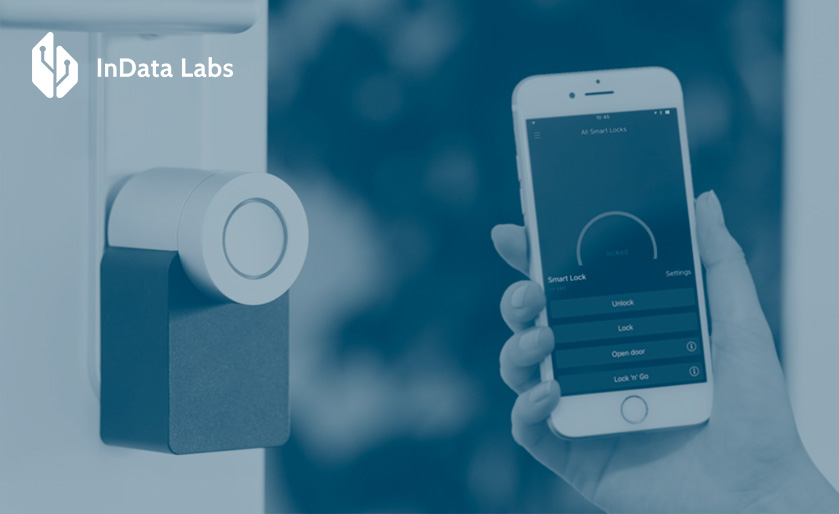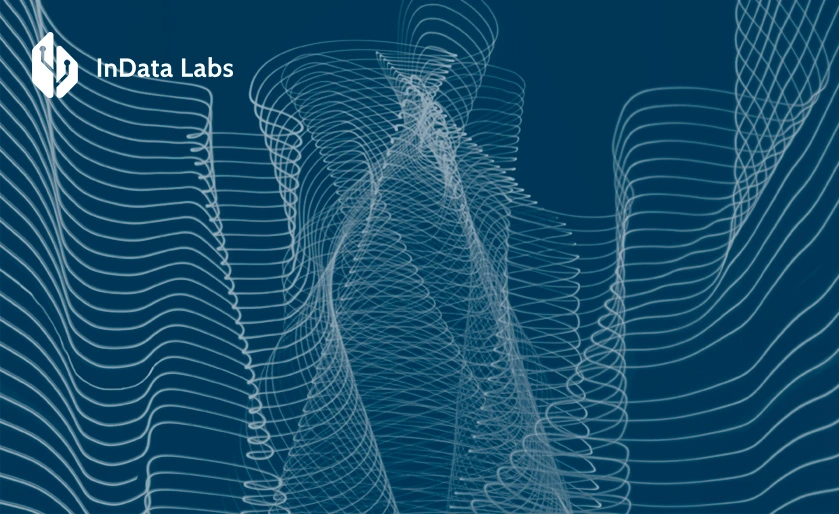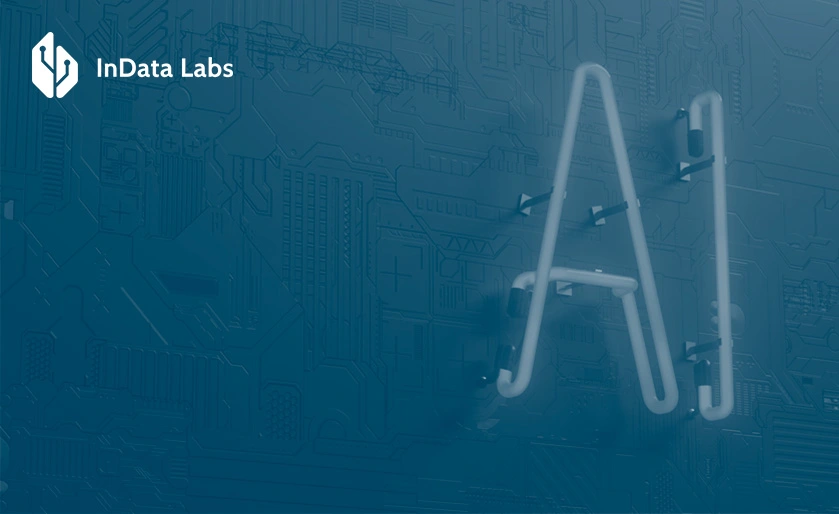Why is there so much puff about IoT artificial intelligence solutions today? Let’s figure it out. The volumes of data grow exponentially every day. It is estimated that about 147 zettabytes of data are generated each day. According to Statista, the number of devices connected to the Internet was over 15 billion in 2023 and will be 23 billion by 2027. The huge growth of the IoT industry will naturally lead to an increase in the amount of information collected. Unfortunately, it becomes almost impossible to analyze this amount of data as they are left aside and forgotten forever, not bringing any benefit to enterprises.
This problem has a solution, and it’s no less technological – businesses can turn data into business solutions, bringing together the forces of artificial intelligence and the Internet of Things. All we need is to analyze the data generated on the devices and gain as many insights as possible.
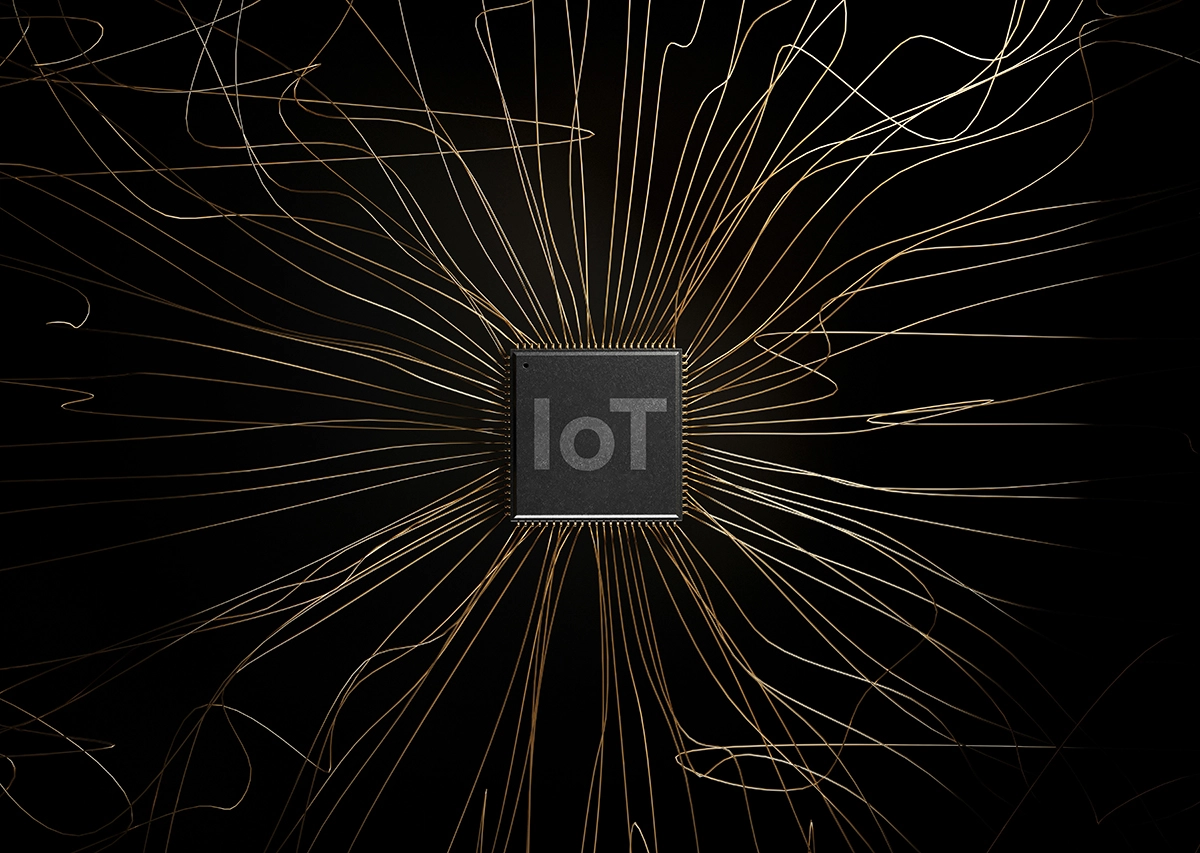
Source: Unsplash
From 60% to 63% of corporate data is left out and not used for analysis. However, companies forget that they can lose up to 12% of their income due to overlooking the possibility of data analysis. To reap the most from their data, companies should combine AI and IoT solutions and use their data to obtain information that was previously unavailable.
In this article, we will delve into the synergy of artificial intelligence and the Internet of Things, how the technologies are connected, and what benefits they can bring to businesses.
What is the Internet of Things (IoT)?
The Internet of Things is a system that consists of a network of smart devices connected to a cloud platform. These devices can collect and transmit data over a wireless network without human intervention. The data that IoT devices collect must be processed and analyzed, otherwise it carries no value. At this point, artificial intelligence comes into play.
What is artificial intelligence (AI)?
Artificial intelligence implies a computer system capable of learning and performing intellectual tasks characteristic of humans. It is able to analyze input data and make decisions independently, without human intervention.
AI with IoT: How the two supplement each other
The relationships between AI and IoT are very similar to those between the brain and the human body. Through the senses, our body gathers sensory information as we see, hear, and feel. This information then goes into the brain for processing, where the brain gives a signal for further action. All the connected devices that make up the Internet of Things are similar to our bodies; they send signals about what is happening in the world. Artificial intelligence, on the other hand, works as a human brain by understanding this data and determining what actions to perform. 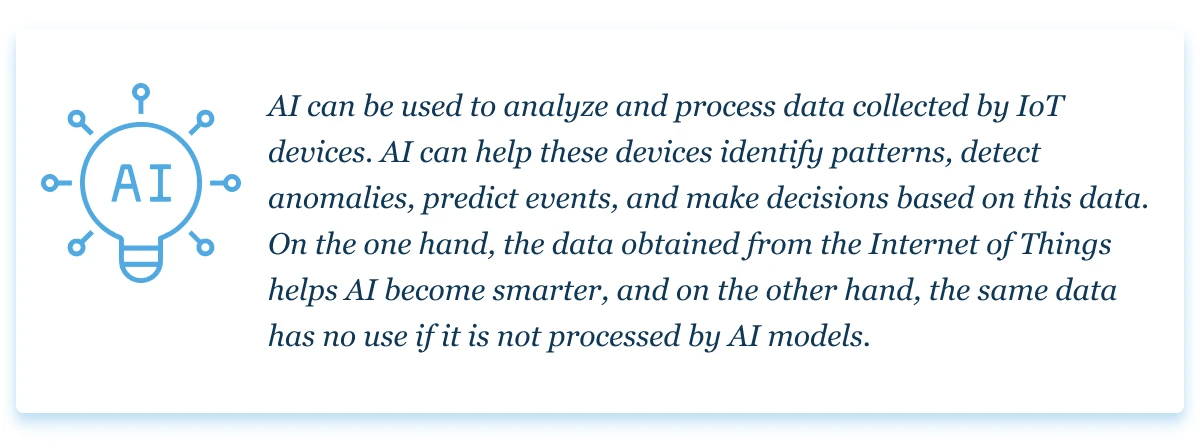
For example, a smart home can be equipped with various sensors that collect information about temperature, lighting, motion, and other parameters. Artificial Intelligence systems can analyze these data and make decisions such as automatic temperature control or turning on light when motion is detected.
So artificial intelligence and the Internet of Things interact to create intelligent and automated systems that can analyze data, make decisions, and perform certain actions based on that analysis. Applying this IoT analytics research improves efficiency, comfort, and safety in various areas.
What is artificial Internet of Things?
Artificial intelligence of Things, or AIoT, is a combination of Artificial intelligence and the Internet of Things. By combining both technologies, we can create more efficient solutions that increase the return on investment. AIoT allows us not only to collect huge amounts of data but also to systematize them, find practical applications, and even predict the future.
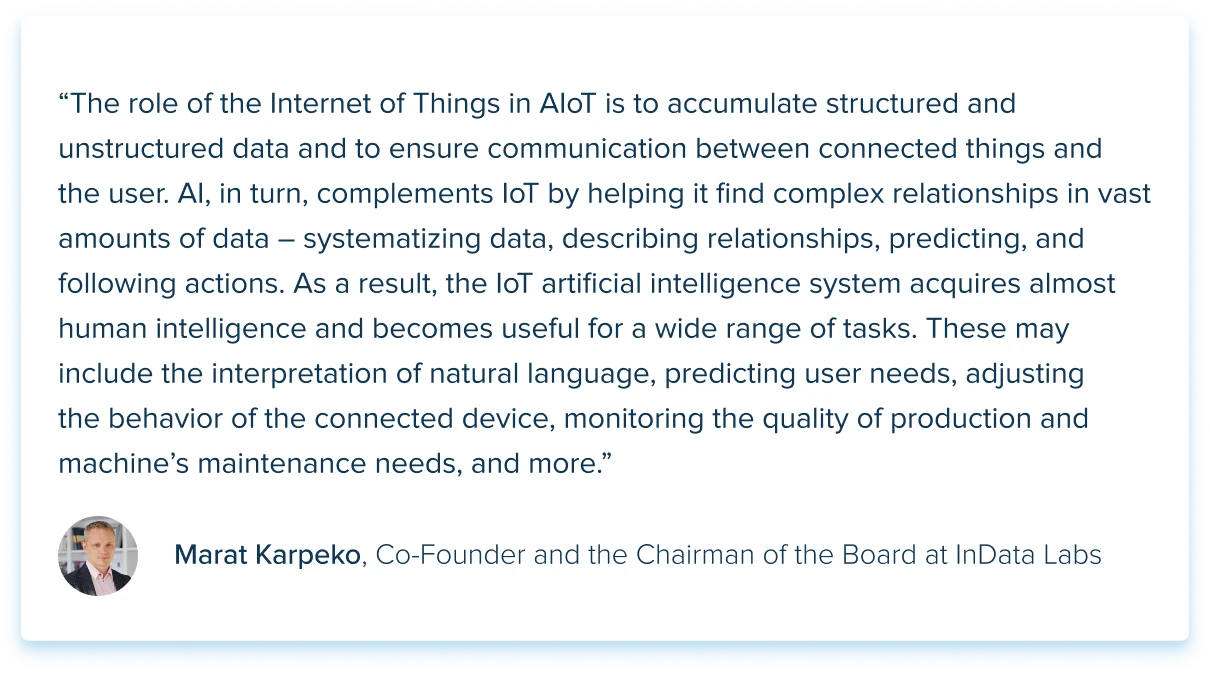
Taken together, the Internet of Things and artificial intelligence open up a world of leading-edge solutions for the optimization of businesses of various domains and levels. This is a new approach that has already started to change the market, pushing forward those companies that are not afraid to risk and try new technological solutions.
The AI in IoT market is currently on the rise. Recent studies estimate it to reach $102.2 billion by 2026. And there is no surprise as AI adds value to the IoT by improving decision-making, and the IoT provides a platform for enhancing AI value through connectivity and seamless data sharing.
Examples of AI in IoT applications
Artificial intelligence plays a crucial role in the development of IoT, providing intelligent and automated systems for analyzing data. The application of AIoT opens up new opportunities to improve efficiency, comfort, and safety in various fields.
Home automation
AI in IoT allows you to create smart homes with different devices and systems interacting with each other and with the home. For example, smart sensors can collect information about temperature, lighting, and other parameters in the home, and AI can analyze these data and make decisions about heating, lighting, and safety.
Urban infrastructure
Another smart IoT analytics example is improving urban infrastructure. Smart sensors and cameras can collect data on traffic, road conditions, and public transport, while AI can analyze these data and propose optimal routes, manage traffic lights, and optimize urban infrastructure.

Source: Unsplash
Transport system
Artificial intelligence IoT projects can also be delivered to improve transport systems. Intelligent sensors and cameras in cars and on the road can collect data on traffic conditions, driver behavior, and vehicle conditions while AI analyzes this data and proposes optimal routes, warns of possible accidents, and can drive cars autonomously.
Manufacturing
Industrial IoT data analytics is increasingly used to optimize production processes. Smart sensors and robots collect data on the state of the equipment, production line, and product quality. Meanwhile, AI analyzes this data and provides optimal solutions to improve the efficiency and quality of production.
AI and IoT use cases by industry
Today an increasing number of companies turn to artificial intelligence development and Big data development services with the desire to improve productivity and widen the range of growth opportunities. IoT and Big data analytics have been a great power in businesses’ digital growth.
Let’s check on the companies that have already been harnessing the technologies and what industries can benefit from them.
Healthcare
AI and IoT in healthcare allow the development of medical devices capable of monitoring patients’ health, predicting possible diseases, and managing treatment. This increases the effectiveness of medical care. AIoT also predicts potential health issues by analyzing patient data from wearable IoT devices, which increases the accuracy of diagnoses and enables early interventions.
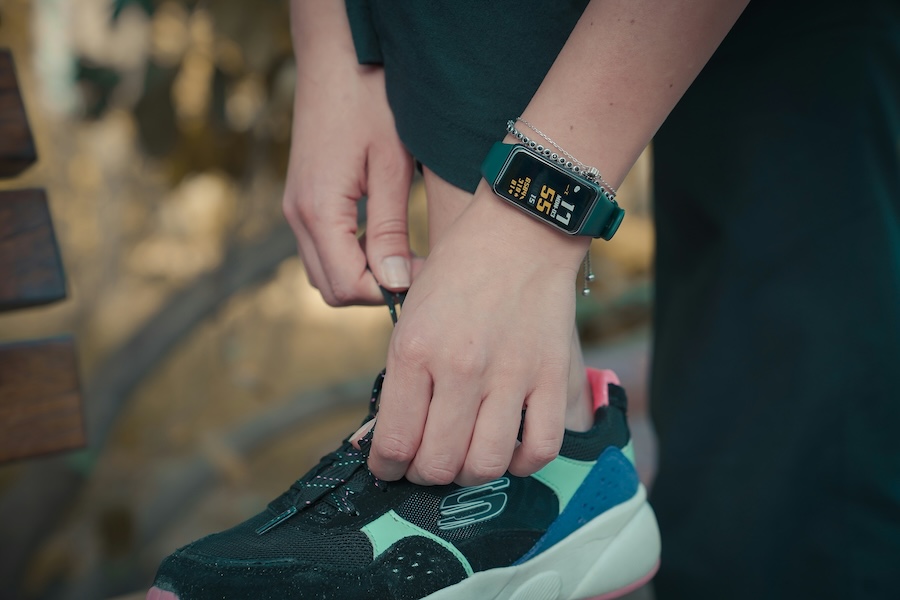
Source: Unsplash
A lot of clinics have enhanced patient care through personalized treatments and remote monitoring with smart AIoT medical devices and IoT analytics research. They also adopted AI and IoT solutions, which helped them improve the provided patient care, monitor medical devices, and prevent downtime with predictive maintenance algorithms.
Retail
There are a bunch of directions in which retail companies can benefit from Smart Building IoT with AI. Its smart data analysis can prevent stockouts in the inventory as well as prevent theft by identifying suspicious behavior. What’s more, predicting consumer demand will help the company keep the right amount of certain items and maximize profits.
These strategies are already being in use by many retail companies. For instance, Amazon and Nike use AI and IoT solutions to manage their inventory, while Walmart and Zara have adopted it to forecast future demand and keep up-to-date with the trends and customer needs.
Finance
AI, ML, and IoT projects are increasingly delivered to finance companies too. First of all, it concerns AI and IoT security which is ensured through analyzing data from devices. It secures transactions with authentication, identifies anomalies to prevent fraud, and helps estimate accurate risk assessments for investments.
These measures were taken by such large AI IoT companies as JPMorgan, Mastercard, and American Express, which achieved a palpable increase in their financial security and reliability of provided services.

Source: Unsplash
Manufacturing
Manufacturing companies also turn to IoT predictive analytics solutions to monitor equipment, optimize production processes, and prevent accidents. Toyota is a great example as it uses predictive maintenance to produce items and control the quality of produced goods. General Electric enhanced its processes and workflow through SmartSignal predictive maintenance software to ensure the quality of its production and prevent manufacturing issues on-site.
Logistics and transportation
There are great growth opportunities brought by artificial intelligence with IoT to logistics companies. Thanks to these technologies, businesses can track their shipments in real-time and optimize routes and inventory for better efficiency. Big data analytics and IoT also let companies predict anomalies and future demand, which contributes to a reduction in extra expenses.
UPS made use of Big data development and predictive analytics and was able to save millions in unnecessary and unplanned maintenance and reduce about 100 million delivery miles. DHL, in turn, uses smart IoT-powered warehouses that make faults immediately visible, monitor stock levels, and improve safety on-site.
Energy
Energy companies are no exception in reaping the benefits of AI and AWS IoT Services. AIoT solutions open up the possibility of smart grid management where constant monitoring helps reduce costs. AI IoT analytics predict failures and perform scheduled maintenance to avoid downtime.
One of the best energy AI and IoT examples is Shell, which utilizes its LubeAnalyst software. This helped reduce maintenance costs and save almost $15,000 per vehicle each year. Another international energy-producing and distributing company, Enel, managed to multiply its grid and distribution efficiency thanks to AIoT-powered systems.
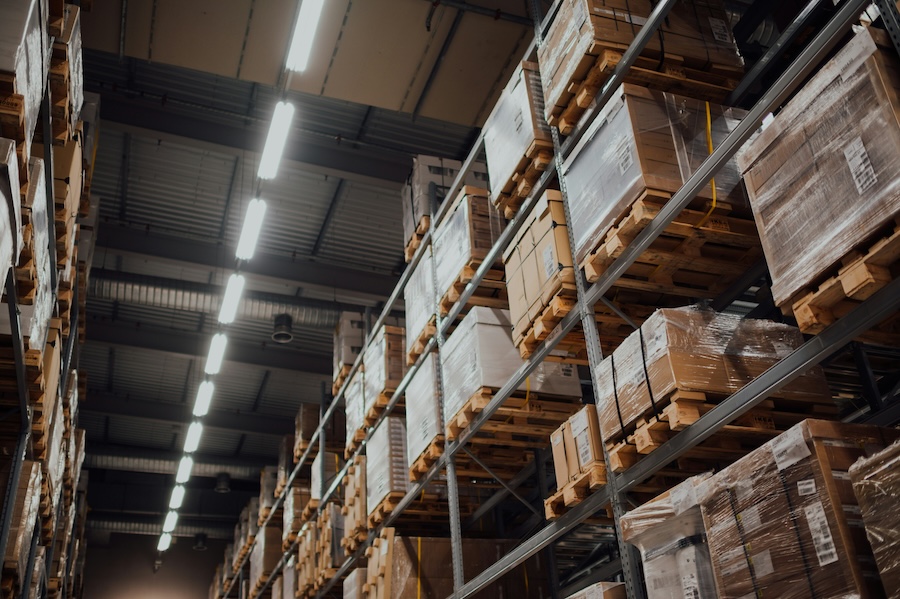
Source: Unsplash
The benefits of IoT and artificial intelligence in business
The combination of IoT and AI can bring unprecedented opportunities and achievements for a business. AI algorithms analyze IoT Big data from devices and provide valuable insights that lead businesses to the right decisions and help improve performance. So, how can a business ramp up with the help of IoT in artificial intelligence?
Data collection and analysis
IoT devices collect huge amounts of data about various parameters and conditions. AI, in turn, processes this data, highlighting significant patterns and information that can be used to make decisions and forecast future trends in the industry.
Optimized management and maintenance
Data analysis with AI improves the management and maintenance of IoT devices. For example, AI models can optimize the work of manufacturing machines, reduce time for maintenance, or optimize inventory or shipment routes to cut down on extra expenses.
Fault prediction and prevention
AI analytics systems monitor real-time data retrieved from all IoT applications, predict faults at an early stage, and take measures to prevent them. This is particularly important in critical areas such as medicine and transportation, where mistakes may end up in great losses.
Improved user experience
AI in IoT devices is able to adapt to user preferences and improve their experience of utilizing the software or services of the company. For example, smart assistants learn from user reactions and become more accurate and useful in providing the needed information.
Personnel and assets safety
Remote round-the-clock monitoring and identifying issues in real time is extremely beneficial, especially in hazardous environments. It also allows for a prompt emergency response to potential risks. All of that helps prevent costly consequences and secure the company’s data and employee safety.

Source: Unsplash
Quality control
Another area where the Internet of Things and artificial intelligence have a significant impact is quality control. By analyzing data collected from sensors, AI algorithms can detect patterns that may indicate quality problems. This capability helps detect and resolve problems early ensuring that only high-quality products will enter the market.
Task automation
In addition, the IoT and AI help to automate complex tasks previously performed by humans. Robots equipped with IoT sensors and AI algorithms can now perform complex tasks with high accuracy. Such process automation not only increases productivity but also reduces the risk of human error and helps improve product quality.
Challenges of integrating artificial intelligence in the Internet of Things
The use of artificial intelligence in IoT devices presents a number of challenges and subtleties that need to be considered when designing and implementing such systems. Some of them are the following:
No clear goal in artificial IoT development
When launching AIoT projects, organizations may be passionate about innovation and not estimate the feasibility of their ideas. This, in turn, could lead to uncontrolled cost increases in the final stages of development and ultimately to dissatisfaction with stakeholders.
Solution: To avoid this, we recommend starting the AIoT project with a research phase. It’s wise to turn to IoT and artificial intelligence consulting services where ideas can be tested and matched with business goals, customer expectations, and organizational capabilities.
Insufficient data to train AI algorithms
To generate reliable information, AI algorithms need to be trained on huge amounts of data. If they are not in sufficient quantity (or available but cannot be used for privacy reasons), you will have to use other strategies to make up for the lack of data.
Solution: Common solutions include transfer learning (using an already trained neural network that solves a similar problem), expanding data volumes (modifying existing patterns to produce new data records), or accessing synthetic data.

Source: Unsplash
Lack of reliability and stability
IoT systems must be robust and fault-tolerant. However, due to the large number of devices and the complexity of interaction between them, there might arise problems with the reliability and stable performance of the system.
Solution: You need to develop backup and recovery mechanisms and maintain and monitor the system regularly.
Low compatibility
The Internet of Things includes many different devices and systems that can be developed by different manufacturers and on different platforms. This creates a problem of compatibility and interaction between different devices.
Solution: Work out standards and protocols that allow different devices to interact with each other.
Fixing software vulnerabilities
Many AI IoT projects fail because the security of data, devices, servers, and communication networks was not considered in the planning phase. This creates a risk of data leaks and breaches of confidentiality.
Solution: If you deal with highly sensitive data, consider a hybrid deployment when the data is processed closer to the source, so the risk of losing it during transmission or in the cloud is minimized. Additionally, have data security mechanisms developed to prevent confidential data breaches.

Source: Unsplash
Ethical issues
Using artificial intelligence in IoT can raise ethical questions about people’s privacy, autonomy, and safety. For example, systems can collect and analyze users’ personal data without their consent or use it for manipulation.
Solution: You need to develop principles of ethics and norms that will regulate the use of AI in your IoT devices.
In general, using artificial intelligence in the IoT sphere presents great opportunities but also involves a number of challenges and problems. That’s why, businesses and software developers should consider these factors and work on their solution to create reliable, safe, and ethical AIoT systems.
Future trends of integrating AI into IoT
Artificial intelligence and the IoT are two powerful cornerstones of today’s advancements that have enormous potential and will continue to evolve in the future. The interaction between them creates new opportunities and horizons for different sectors and areas of life.
High-tech manufacturing
We are already observing a considerable upswing in the manufacturing sector with the advent of artificial IoT. Continuous surveillance will be automated, which, in turn, will have a positive effect on production effectiveness, product quality and will diminish mistakes. Real-time control and prompt detection of deviations will bring manufacturing businesses productivity to unprecedented levels.
Autonomous vehicles
The two technologies are going to play a critical role in the development of autonomous vehicles. Vehicle sensors and cameras collect data on traffic, other vehicles, and pedestrians. Artificial intelligence analyzes this data and makes decisions about driving a car. This allows for safe and efficient autonomous transport systems.
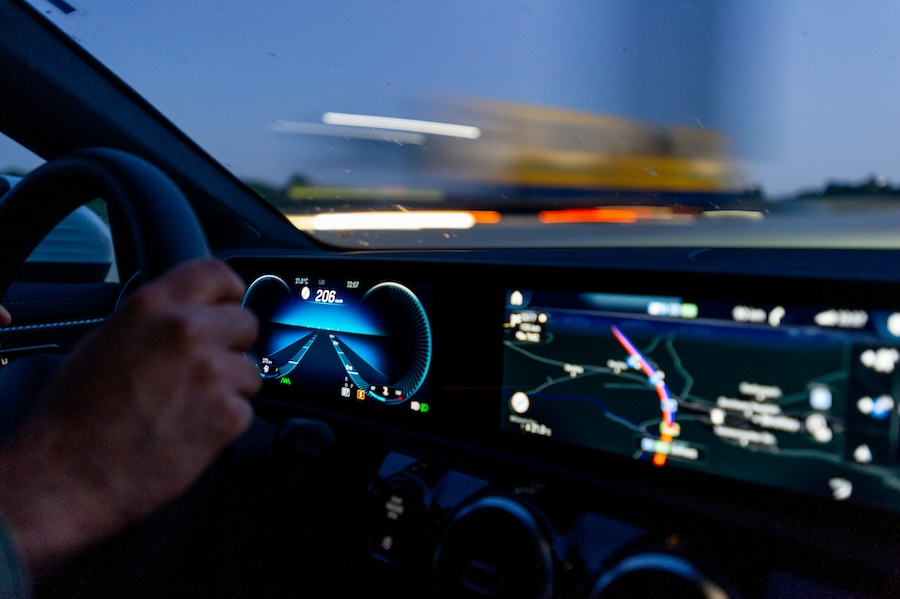
Source: Unsplash
Personalized user experience
IoT helps collect vast amounts of user data such as customer preferences, behavior, purchase history, and location details in real-time. Analyzing it with AI can unlock insights otherwise overlooked by humans. That’s why smart assistants, recommendation systems, and other AI algorithms will be present almost everywhere to deliver the most personalized experience to every client.
To learn more about the benefits of virtual assistants, please watch a video about InData Labs’ chatbot Aurora Borea:
Smart cities
Today’s IoT and Big data analytics trends demonstrate that artificial IoT will be the cornerstone in building smart cities. IoT devices such as sensors, cameras, and smart systems can collect data on the state of urban infrastructure, vehicles, and the environment. AI models can analyze this data and offer solutions to improve the urban environment, transport management, and safety.
Advanced healthcare services
Modern medicine and patient care will no longer be possible without integrating IoT and AI projects. They may include wearable devices and medical sensors that can collect patient health data. Artificial intelligence will analyze the data and make recommendations for treating and caring for patients. This will bring a palpable improvement in diagnosis-making and preventing diseases with predictive diagnostics and will improve the overall quality of life.

Source: Unsplash
The conclusion
A close collaboration of artificial intelligence and IoT analytics keeps breaking the limits of the impossible with its countless applications across many industries. More and more companies invest in artificial IoT solutions to gain an edge with advanced user experience, security, and business performance.
A well-conceived plan of IoT AI integration into business is posed to bring palpable benefits and leverage coming data to the fullest. Let’s look forward to further groundbreaking applications of AI IoT and the advancements it will encourage.
FAQ
-
IoT data analytics implies collecting and analyzing data that comes from IoT devices and deriving valuable insights based on this data. Today, it is increasingly utilized in combination with artificial intelligence, which supplements and widens the opportunities in the sphere, including predictive analytics, generative algorithms, and others.
-
IoT presupposes that there are numerous interconnected devices that constantly collect data but this data is a waste if it is not analyzed. Businesses integrating IoT and data analytics enjoy the benefits of predictive maintenance, downtime cutdowns, and better awareness of future trends and customers’ preferences.
-
AI takes the value of IoT to the maximum. It allows companies to automate many tasks and operations related to IoT devices and retrieve the biggest value possible from the collected data. As a result, the workflow becomes smoother, human errors are minimized, and the business saves considerable sums thanks to faster and more quality production or services provided.
-
AI has become an indispensable part of today’s business and daily life. It makes numerous tasks automated, decreasing the time needed for their completion and the number of human mistakes. Your data thanks to artificial intelligence is no longer useless, as its AI analysis allows us to identify previously unseen patterns and use these insights to analyze the reasons for past failures and successes, the present business performance, and future trends to pay attention to.
-
Artificial intelligence IoT and automation are inseparably linked. The adoption of AI makes lots of operations dramatically easier as they are automated, constantly monitored, and reduced in time. All the collected data that falls under AI analysis becomes useful with the aim of improving customer experience, staying ahead of competitors, and doing more in less time.
-
AI in smart devices adds features like recognizing speech, processing images, predicting when maintenance is needed, and providing personalized experiences to make devices work better and interact with users using AI technology.
-
Embedded AI and IoT are combined by integrating AI systems into IoT devices for real-time data processing, making decisions promptly at the device level, and automating tasks. This ultimately improves the speed, efficiency, and analytical capabilities of IoT applications.
-
AI in IoT and IIoT boosts efficiency by predicting machine maintenance needs, fine-tuning manufacturing operations, identifying alarming issues, and suggesting solutions to them. All of the points above help industrial companies produce or deliver items of better quality much quicker and with lower expenses.
